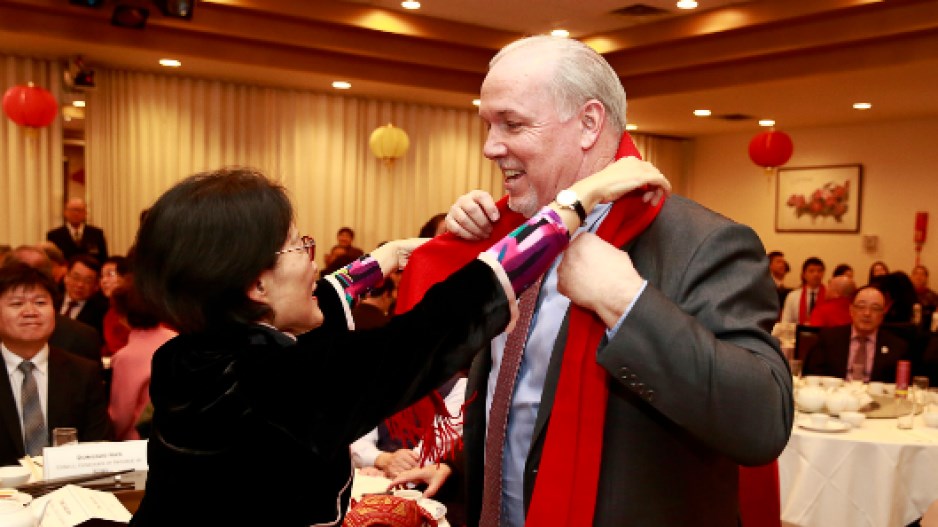B.C. politicians shouldn’t dodge human rights issues in China, particularly if they want to continue engaging with the Chinese Communist Party (CCP) following this Saturday’s provincial election.
That’s the position of MP Garnett Genuis, Canada’s opposition critic for international development and human rights.
“I would definitely not agree with the idea that human rights is only the concern of one order of government. I think it’s something we all need to be concerned about,” Genuis told Glacier Media last month.
“Obviously, federally, we have a greater capacity to deal with them directly, because we're the primary order of government when it comes to international diplomacy,” said Genuis, MP for Sherwood Park-Fort Saskatchewan. “But other orders of government are involved in international diplomacy to some extent, and they are also involved in signing agreements that have potential human rights implications.”
However, on the campaign trail, both Andrew Wilkinson, leader of the BC Liberals, and John Horgan, leader of the BC NDP, say human rights concerns in China are the dominion of the federal government. This, despite Wilkinson signing a memorandum of understanding on China’s Belt and Road Initiative in 2016, with Guangdong province, and Horgan maintaining support for the MOU after forming government in June 2017.
On Wednesday, a House of Commons subcommittee on human rights told how China is committing acts of genocide against Uyghur Muslims in northwest China, in part to expand BRI-linked resource projects through Central Asia.
“It is important to acknowledge how other forms of cooperation that happen at the sub-national level do have human rights implications,” said Genuis. “Governments at all levels need to think very carefully about the implications of their engagement with the Chinese government.”
The BRI is a trade-based foreign policy for China under President Xi Jingping. However, it includes all aspects of political, economic and social influence by China, experts say.
While the two largest provincial parties have declined interviews on the subject, Genuis said provincial and municipal politicians should be aware of consequences in signing agreements with authoritarian regimes.
“There are areas where engagement and cooperation makes sense, but I think we do need to be very careful,” said Genuis. “And the Belt and Road Initiative is certainly a brand that we should be leery of as Canadians, because it's associated with an effort to project Chinese politics and control beyond its borders,” said the vice-chair of the Special Committee on Canada-China Relations.
Even routine procurement needs to be examined, he said.
“There's been a lot of discussion recently about, you know, concerns about personal protective equipment that comes from China, that it actually has been made through Uyghur forced labour. That’s obviously something the federal government, but also sub-national governments, need to be aware of,” said Genuis.
The failure of the BC NDP and BC Liberals to address human rights in China, particularly given B.C. is a rare signatory to a BRI MOU among Western jurisdictions, has disappointed Chinese-Canadian activists who are campaigning to have politicians pledge against foreign interference (in the absence of laws in Canada that do so).
“These sorts of issues are actually heavily provincial and municipal. I think it isn't just like a thing that a provincial politician can just defer and say, ‘Oh, I'll just let the federal government do that kind of thing,’” said Jane Li, a member of local pro-democracy group Vancouver Hong Kong Political Activists.
“Isn’t it the province’s responsibility to protect B.C. residents and their safety and interests here?” asked Li, whose group contends agents of the CCP are harassing and intimidating Canadian citizens who publicly critique China.
The silence from Horgan and Wilkinson has puzzled many in the Hong Kong diaspora, Li said.
“The fact we need a campaign to ask our politicians to not be influenced by foreign governments is ridiculous,” she said of the “No BC for Xi” campaign.
Activists such as Li have largely tabled concerns about China’s imposition of a national security law that guts the democratic system in Hong Kong, where there are roughly 300,000 Canadian citizens, as well as the arbitrary detention of Canadians following the arrest of Huawei CFO Meng Wanzhou.
In May, an Angus Reid poll showed just 16% of Canadians held a favourable view of China.
Genuis said there is a “sharp disconnect” between the Canadian public and political elites who “dismiss legitimate security concerns.”
Genuis said some liberal politicians may be holding on to past ideals that China can reform – ideals he conceded were adopted by his own Conservative party about 10-15 years ago, but that turned out to be “an understandable mistake in the context of what was happening at the time.”
But now, a “basic intuition” has “turned out to be the correct one,” he said – “that a government that is genocidal and totalitarian is one that cannot be trusted.
“And I think it's becoming harder and harder to argue the contrary, in this current environment.
“Today, there's just no excuse for having your head that far in the sand and yet, you know, we still have too many politicians that do.”




